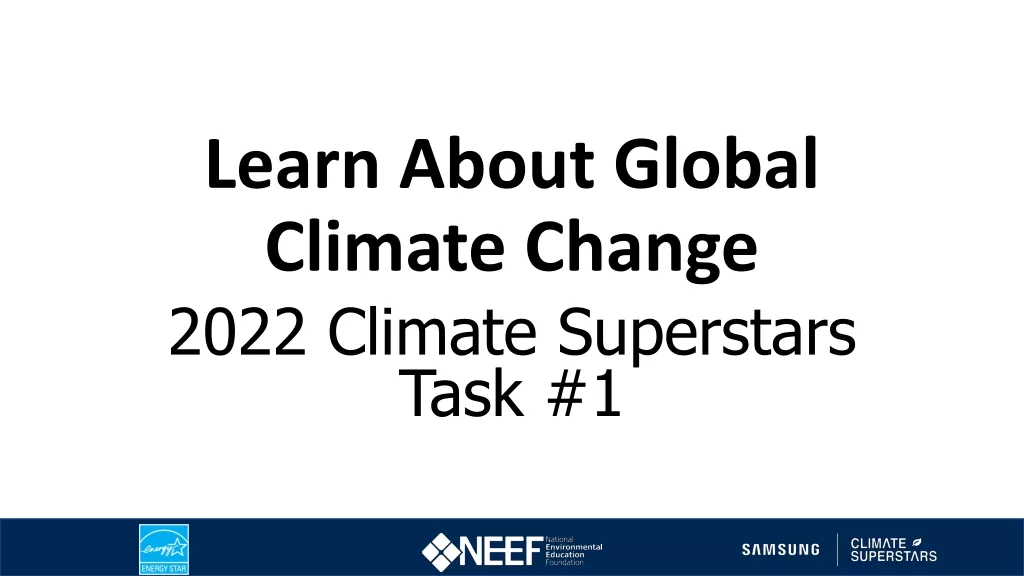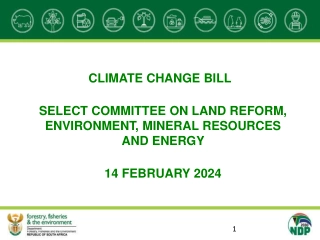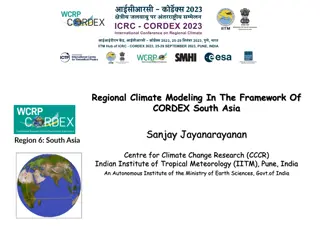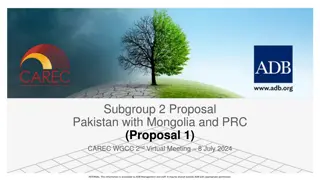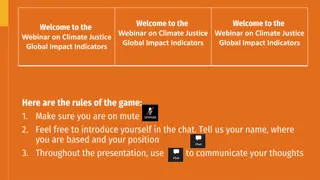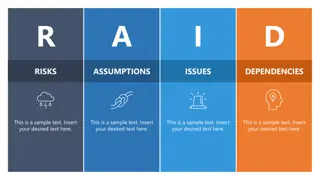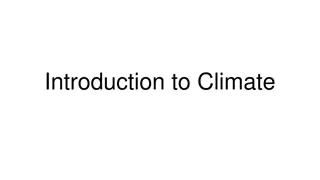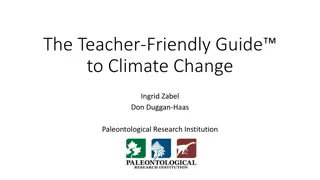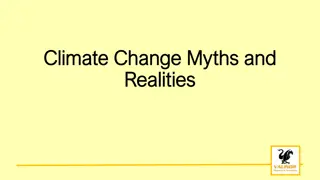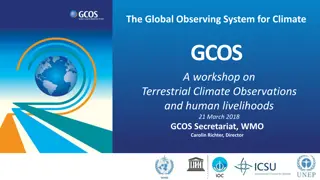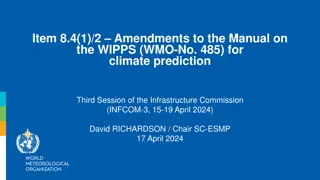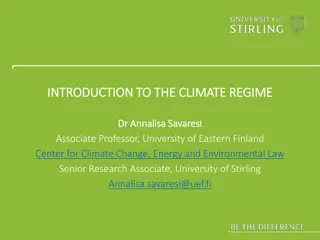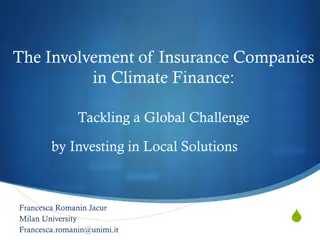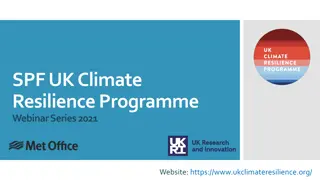
Economic Valuation of Climate Change Impacts on Ecosystems: A Meta-Analysis
Dive into the vast literature on economic valuation of changes in ecosystems and ecosystem services, exploring the role of climate change. This meta-analysis aims to synthesize effect sizes and identify determinants related to climate-induced changes and trust in institutions.
Download Presentation

Please find below an Image/Link to download the presentation.
The content on the website is provided AS IS for your information and personal use only. It may not be sold, licensed, or shared on other websites without obtaining consent from the author. If you encounter any issues during the download, it is possible that the publisher has removed the file from their server.
You are allowed to download the files provided on this website for personal or commercial use, subject to the condition that they are used lawfully. All files are the property of their respective owners.
The content on the website is provided AS IS for your information and personal use only. It may not be sold, licensed, or shared on other websites without obtaining consent from the author.
E N D
Presentation Transcript
Economic valuation of climate change impacts on ecosystems: a meta-analysis Anne Nobel1, Sebastien Lizin1, Stephan Bruns12, David Stern3, Robert Malina14 1 Research Group Environmental Economics, Hasselt University, Martelarenlaan 42, 3500 Hasselt, Belgium 2 Department of Economics, University of G ttingen, Humboldtallee 3, 37073 G ttingen, Germany 3 Crawford School of Public Policy, The Australian National University, 132 Lennox Crossing, Acton, ACT 2601, Australia 4 Laboratory for Aviation and the Environment, Department of Aeronautics and Astronautics, Massachusetts Institute of Technology, 77 Massachusetts Avenue, Cambridge, MA 02139, USA Learning on Climate Solutions Workshop Berlin, October 2018 Learning on Climate Solutions Workshop Berlin, October 2018 UNIVERSITY OF LEEDS Priestly International Centre for Climate MCC Organised by:
Motivation What is the motivation for the project, and why does this subject warrant a review? Vast and heterogeneous literature on the economic valuation of changes in ecosystems and ecosystem services. Valuation seems to differ with respect to the causes. Which role does climate change play? What is the research question underpinning this review? What is the willingness to pay to avoid climate-induced changes in ecosystems and their services? What are the specific objectives of the review? Systematic review / meta-analysis of the economic valuation literature on changes in ecosystems Synthesis of effect sizes and identification of determinants (1) Climate-induced change and (2) trust in institutions Learning on Climate Solutions Workshop Berlin, October 2018 UNIVERSITY OF LEEDS Priestly International Centre for Climate MCC Organised by:
Literature search and selection How will you identify the appropriate evidence for the review? We search for published and unpublished articles in the following databases: Web of Science, Scopus, RePEc, Proquest Central, EconLit and Google Scholar. We expect to include between 15-20 studies focusing solely on avoiding climate- induced changes in ecosystems, and 100-150 studies focusing on changes in ecosystems in general Search query willingness-to-pay OR stated OR preference OR contingent OR economic OR value AND biodiversity OR species OR nature OR ecosystem OR habitat OR protected area OR conservation OR site AND conservation OR preservation OR degradation OR loss OR climate change OR adaptation Learning on Climate Solutions Workshop Berlin, October 2018 UNIVERSITY OF LEEDS Priestly International Centre for Climate MCC Organised by:
Literature search and selection How will you select the articles or documents that will be included in the review? Criterion Quality Definition The stated preference study included a pre-test or focus group The study is grounded in a theoretical model of welfare Value type Only studies targeting the total economic value of changes in ecosystems are selected. Sampling Only estimates for samples that are randomly selected from a delineated geographical region are selected. Studies that rely on on-site sampling are only selected if they account for on-site sampling bias Only studies that measure WTP based on a Hicksian demand specification are included Studies are only selected if they focus on the conservation of a habitat with geographical delineation, one or multiple species or taxonomic groups, or both Only studies with a quantitative change, or a qualitative change with a clearly specified spatial extent, are selected. The change should have a clearly specified reference and target level, that can be accounted for in the meta-regression model. Welfare measure Commodity Specification environmental change of Learning on Climate Solutions Workshop Berlin, October 2018 UNIVERSITY OF LEEDS Priestly International Centre for Climate MCC Organised by:
Synthesis What information will be extracted from the documents? Dependent variable Willingness to pay Main explanatory variables (1) Climate-induced change in ecosystems and (2) trust in institutions Environmental goods characteristics Study characteristics and context variables Learning on Climate Solutions Workshop Berlin, October 2018 UNIVERSITY OF LEEDS Priestly International Centre for Climate MCC Organised by:
Synthesis How will you summarise or synthesise this information? Narrative review and meta-regression Meta-regression OLS with clustered standard errors / RE as check Top 10% Publication bias and p-hacking Funnel plot Egger-regression / Precision-Effect Test Test for discontinuities Reporting errors Learning on Climate Solutions Workshop Berlin, October 2018 UNIVERSITY OF LEEDS Priestly International Centre for Climate MCC Organised by:
Expected outcomes What are the expected outcomes of your review? Summary of effect sizes Meta-regression model that explains variation in observed effect sizes (methodological vs genuine heterogeneity) Role of (1) climate change and (2) trust Assessment of reliability of published findings What are the main challenges in your review? Substantial heterogeneity of primary studies What resources (researcher time) can you commit to the review? Will you use a systematic review program or platform? Anne Nobel (first author) receives scholarship from the Research Foundation Flanders (FWO). Learning on Climate Solutions Workshop Berlin, October 2018 UNIVERSITY OF LEEDS Priestly International Centre for Climate MCC Organised by:

